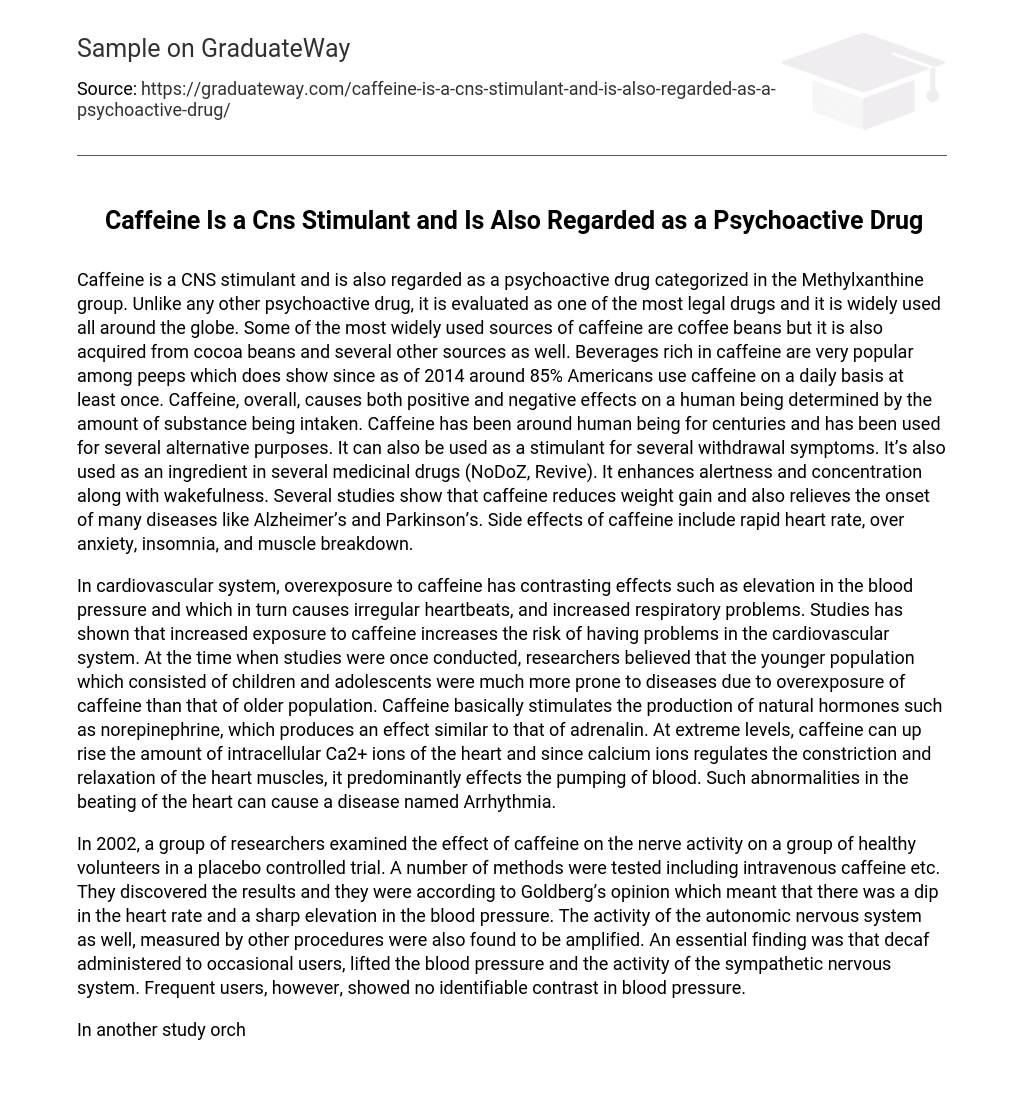Caffeine is a CNS stimulant and is also regarded as a psychoactive drug categorized in the Methylxanthine group. Unlike any other psychoactive drug, it is evaluated as one of the most legal drugs and it is widely used all around the globe. Some of the most widely used sources of caffeine are coffee beans but it is also acquired from cocoa beans and several other sources as well. Beverages rich in caffeine are very popular among peeps which does show since as of 2014 around 85% Americans use caffeine on a daily basis at least once. Caffeine, overall, causes both positive and negative effects on a human being determined by the amount of substance being intaken. Caffeine has been around human being for centuries and has been used for several alternative purposes. It can also be used as a stimulant for several withdrawal symptoms. It’s also used as an ingredient in several medicinal drugs (NoDoZ, Revive). It enhances alertness and concentration along with wakefulness. Several studies show that caffeine reduces weight gain and also relieves the onset of many diseases like Alzheimer’s and Parkinson’s. Side effects of caffeine include rapid heart rate, over anxiety, insomnia, and muscle breakdown.
In cardiovascular system, overexposure to caffeine has contrasting effects such as elevation in the blood pressure and which in turn causes irregular heartbeats, and increased respiratory problems. Studies has shown that increased exposure to caffeine increases the risk of having problems in the cardiovascular system. At the time when studies were once conducted, researchers believed that the younger population which consisted of children and adolescents were much more prone to diseases due to overexposure of caffeine than that of older population. Caffeine basically stimulates the production of natural hormones such as norepinephrine, which produces an effect similar to that of adrenalin. At extreme levels, caffeine can up rise the amount of intracellular Ca2+ ions of the heart and since calcium ions regulates the constriction and relaxation of the heart muscles, it predominantly effects the pumping of blood. Such abnormalities in the beating of the heart can cause a disease named Arrhythmia.
In 2002, a group of researchers examined the effect of caffeine on the nerve activity on a group of healthy volunteers in a placebo controlled trial. A number of methods were tested including intravenous caffeine etc. They discovered the results and they were according to Goldberg’s opinion which meant that there was a dip in the heart rate and a sharp elevation in the blood pressure. The activity of the autonomic nervous system as well, measured by other procedures were also found to be amplified. An essential finding was that decaf administered to occasional users, lifted the blood pressure and the activity of the sympathetic nervous system. Frequent users, however, showed no identifiable contrast in blood pressure.
In another study orchestrated by Jackman, he examined the ramifications of caffeine on catecholamine on a few athletes while performing extreme exercises. The athletes were provided with 6mg of caffeine per 1 kilogram of their weight before executing the exercise. The exercise routine comprised of intense cycling for 2 minutes so to maximize the oxygen uptake, then a resting phase and then cycling again until the athletes are tired. On scrutinizing they found a minute raise in endurance to exercise and significantly higher plasma epinephrine levels. These corroborations all point towards the increase in the excitation of the sympathetic nervous system.
Several studies, have shown that decaf administrated to occasional users increased blood pressure and activity of the sympathetic nervous system. Frequent users showed no increase in overall blood pressure. Overexposure to caffeine increases the risk of hypertension particularly among younger population consisting of children and adolescents. This in turn, elevates blood pressure which also can cause tachycardia which is rapid heartbeat due to errors in the electrical systems of the heart. Some researchers believe that caffeine could inhibit the production of a hormone that regulates the width of blood vessels. Caffeine promotes adrenaline release from adrenal gland which results in elevated blood pressure. Endothelial cells are found in the inner lining of the vessels of the blood. ECF has an essential role in regulating vascular tone, avoiding thrombosis, and preventing damage to arteries by acting as a protective layer. Increased exposure to caffeine causes high risk of abnormal ECF. Abnormal ECF destroys the ability of the blood vessel to dilate and constrict normally and cause variance in proper supply of the blood, that is with the heart beating more harder and needing more blood flow at the same time not being able to open up the arteries to make the blood flow better. Improvising ECF is a very difficult task to do so but can be done in lots of ways such as exercising, reducing smoking, by consuming certain antioxidants (example-vitamin C), cholesterol-regulating statins.
This research was conducted in order to find out the different risks as well the different effects of caffeine on the human body particularly the cardiovascular system of a human being which basically consists of the circulation system. Through this research we have found out that caffeine can have both benefits as well as side effects (only on excessive usage) on a person. These side effects are almost incurable diseases such as tachycardia, arrhythmia, etc. When consumed frequently, it can increase a person’s wakefulness as well as strength but overdose of caffeine can cause serious health issues.





